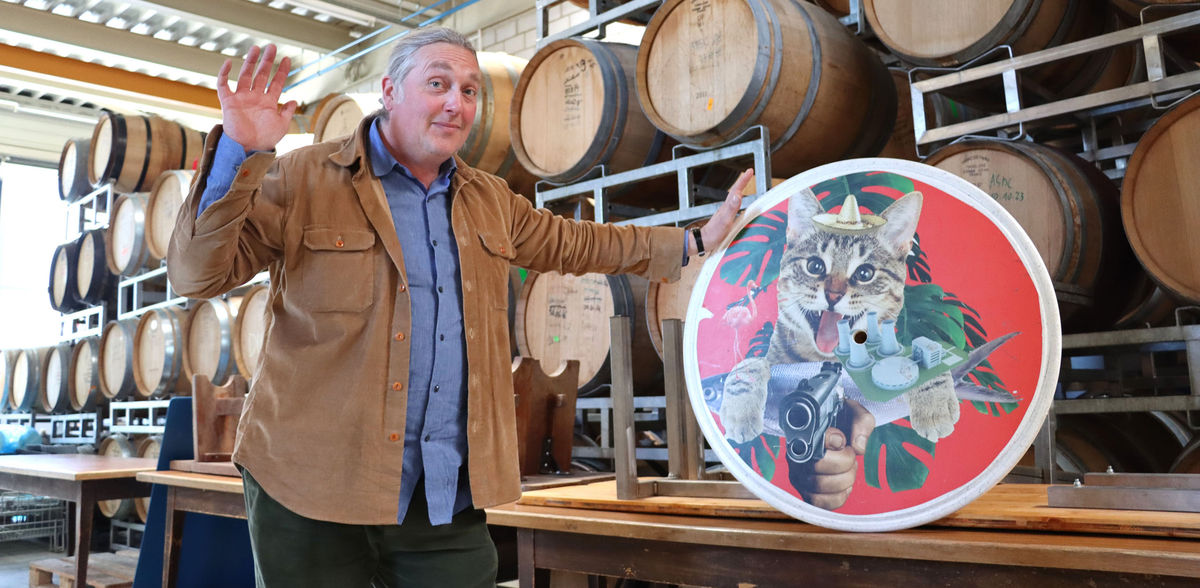Boom, crisis, new start - the development of the brewing scene using the example of the Brasserie Franches-Montagnes
Advertisement
Boom, crisis, new start - the development of the Brewing scene using the example of Brasserie Franches-Montagnes
On Friday, April 25, 2025, the Swiss Brewers' Association is calling for participation in "Swiss Beer Day". The aim is to celebrate the craft of the Swiss brewing tradition with tastings and events. This comes at a time when many small players, which have been growing in number for around thirty years, are increasingly struggling to survive. Some, such as the Franches-Montagnes brewery, are breaking new ground. An on-site inspection. Last updated on April 17, 2025 by Etienne Arrivé / AGIR
The Brasserie des Franches-Montagnes in Saignelégier in the canton of Jura was founded in 1997 by Jérôme Rebetez, who still runs it today. It is now increasingly focusing on lager - the "thirsty beer" - which was previously almost exclusively the preserve of large industrial companies. A conversation with the unconventional fifty-year-old, a master of striking statements, but also of subtle nuances.
In recent years, everyone has wanted to produce locally. This has led to a boom in Swiss beers from small and medium-sized companies. In 1990, there were just 32 breweries in Switzerland. After the end of the beer cartel, which regulated the market from 1935 to 1991, new projects sprang up like mushrooms. In 2021, there were 1,278 registered breweries - a record. Since then, however, the number has fallen again. In January 2025, there were still 1,149. Have there simply become too many?
Jérôme Rebetez: In some cases, it has simply gone too far. There was a lot of experimentation - beers with fruit juices, with lactose. The big companies have adopted this trend and launched countless new brands. In this way, the craft movement has somehow cut itself off.
On the other hand, we have the idea that "small is beautiful" - you have to be small to be good. But that's a fallacy. Small is not the same as "artisanal".
I deliberately describe myself as an entrepreneur. My goal has always been to develop the brewery and grow the company. Even if that has been extremely challenging over the last four or five years - since the coronavirus pandemic.
Meanwhile, many people are building their brewery in the garage, celebrating its different nature - and accusing me of thinking too big. To which I say: "Bullshit!" Even though Brasserie des Franches-Montagnes is one of the 50 largest breweries in the country by volume, accounting for 98 percent of local beer production, we make up just 0.1 percent of the Swiss market.
You yourself started out small: At the age of 23, you built your first brewing system from an old cheese vat - with a friend as a locksmith, financed with prize money from a TV competition...
Jérôme Rebetez: Yes, we certainly helped trigger the DIY trend. Many people thought that if this long-haired guy from the Jura can build a brewery, then I can too. And many have managed it - that's great!
But what I think is a shame is that many people concentrate on the few outlets where they themselves like to drink beer. That's a strategy where everyone loses.
To be successful, you have to create market share instead, like we did 30 years ago with new products. You can't just be satisfied with being the next "new" brewery that produces locally. I reckon that 80 to 100 small breweries will close in Switzerland every year over the next three to four years.
At Brasserie des Franches-Montagnes, we have four salespeople who are immediately on hand with offers when we hear about quality problems somewhere. I have no sympathy for breweries that flood the market with poor quality.
What does "artisanal" mean anyway?
Jérôme Rebetez: A craft product is different in that it stands out from the market - it wants to stand out, surprise, lure the public out of its shell.
Unfortunately, we in the craft scene missed the opportunity to join forces early enough. Now the big players are pretending to be artisanal. Brasserie Valaisanne, for example, belongs to Carlsberg. That's "craft washing" - in other words, pseudo-craft.
At Brasserie des Franches-Montagnes, we have banned the term "artisanal" from our communication since 2019 in order to emphasize the professionalism of our qualified brewers instead. We invest millions in quality assurance, logistics and marketing. Of course, we have our craft under control - but we are much more than just "artisan".
And local - what does that mean?
Jérôme Rebetez: We prefer to say regional. This shows our aspiration to assert ourselves in an entire region.
And to be honest, many raw materials come from further afield anyway. Spices only account for a few kilos a year, but with malt it's crucial. We do work with a local malt house for certain projects - the Malticulture cooperative in the Jura. But if we want to remain competitive with low-margin products, we have to buy at the best price.
And those who lecture us on this are often the same people who buy the cheapest special offer beer in the supermarket. And if they then have a state-guaranteed wage, they should know: We are struggling to employ 35 people.
Selling beer is more difficult than brewing it. Competition is tough, price pressure is high, quality standards are high and maintaining relationships is crucial. That's why we say: "Regional and independent" - that's our identity. And independence is a core value for me.
Many breweries are now focusing on the lager market segment - the "thirsty beer" that used to be left to the big players. Brasserie des Franches-Montagnes too?
Jérôme Rebetez: I used to think, somewhat naively, that I would leave this beer to the industrial breweries and they would let me have the second, third or fourth tap in return. But the reality is different: the big breweries are like a rooster in a henhouse - they all want hens. They have also ventured into our craft territory.
We have shown them how to generate added value with these products. They should actually be paying me money for it today - as much as they earn from it.
So we started developing our own lager two years ago. Craft beers only make up 10 to 15 percent of the market and are on the decline. That's why we built a second production facility even before the Covid pandemic - to target precisely this 85% lager market.
For 2025, we expect our new blond beer to account for 80,000 to 100,000 liters annually - out of a total production of around 500,000 liters.
The Swiss Brewers' Association is promoting the profession of brewing technologist EFZ specializing in beer - because of a shortage of skilled workers. Is this real?
Jérôme Rebetez: Absolutely. A lot has been done, for example with the new French-language training program at the Grangeneuve Agricultural Institute. I told our apprentice: "If you sign up, you'll go through with it - and I'll be breathing down your neck to make sure it works!
But so far we've almost only had foreign brewers - there are currently three: an Italian, a Frenchman and a German. I myself haven't brewed for ten years. They say you should hire people who are smarter than you are - and that was pretty easy for me.
The brewery in Saignelégier was also a cultural stage for a long time as "Hopscène" - now the group Trudi et Doudi Productions is taking over the program. What's behind it?
Jérôme Rebetez: After the dissolution of "Hopscène", we didn't want everything to end. The idea of combining culture and beer came about 15 years ago.
At the time, I was told that our beer styles were not compatible with a festival atmosphere - too special, not relaxed enough. So we organized concerts - and proved that it did work.
In the end, however, it became too expensive. Now we want to start again with more modest means - with around 15 events a year.
Source: https://www.lid.ch/artikel/boom-krise-neustart-die-entwicklung-der-brauszene-am-beispiel-der-brasserie-franches-montagnes
Note: This article has been translated using a computer system without human intervention. LUMITOS offers these automatic translations to present a wider range of current news. Since this article has been translated with automatic translation, it is possible that it contains errors in vocabulary, syntax or grammar. The original article in German can be found here.
Other news from the department business & finance
Most read news
More news from our other portals
See the theme worlds for related content
Topic world Quality assurance
In the food industry, quality assurance is about much more than safety. It's about ensuring consistent standards that meet consumers' taste, nutritional and aesthetic expectations. Using state-of-the-art analytical methods and strict protocols, Quality Assurance ensures that every product delivers on the brand's promise. From appearance and taste to texture and shelf life, Quality Assurance ensures consumers get exactly what they expect.

Topic world Quality assurance
In the food industry, quality assurance is about much more than safety. It's about ensuring consistent standards that meet consumers' taste, nutritional and aesthetic expectations. Using state-of-the-art analytical methods and strict protocols, Quality Assurance ensures that every product delivers on the brand's promise. From appearance and taste to texture and shelf life, Quality Assurance ensures consumers get exactly what they expect.

































































